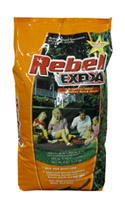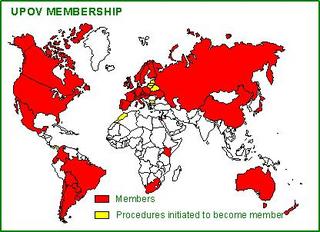In a Citable Decision, TTAB Confirms that Varietal Names are Unregistrable, and Affirms Genericness Refusal of "REBEL" for Grass Seed
In its eighth citable decision of 2005, the TTAB again laid down the lawn [pun!] by reiterating that "varietal names are generic designations and cannot be registered as trademarks." Consequently it affirmed a refusal to register the term REBEL as a trademark for "grass seed." In re KRB Seed Co., LLC, 76 USPQ2d 1156 (TTAB 2005).

Applicant admitted that REBEL is a varietal name for a type of grass seed that was the subject of a plant variety protection certificate. Moreover, the PTO's evidence -- including a listing of REBEL as the "denomination" of a tall fescue variety with the International Union for The Protection of New Varieties of Plants (UPOV) -- independently established that REBEL is a varietal name for grass seed. Therefore, the issue for the Board was "whether the USPTO's application of prior case law and resulting policy treating varietal names as generic is valid."
 The Board noted that it has treated varietal names as generic designations for several decades, as reflected in TMEP Section 1202.12. Applicant KRB argued that the PTO's treatment of varietal names is "wrong, dated and inconsistent with modern intellectual property law." It pointed to a passage in a 1942 decision by the U.S. Court of Appeals for the Columbia Circuit, Dixie Rose Nursery v. Coe, 55 USPQ 315 (D.C. Cir 1942), suggesting that a varietal name might be registrable. The Board, however, dismissed the cited passage as mere dictum.
The Board noted that it has treated varietal names as generic designations for several decades, as reflected in TMEP Section 1202.12. Applicant KRB argued that the PTO's treatment of varietal names is "wrong, dated and inconsistent with modern intellectual property law." It pointed to a passage in a 1942 decision by the U.S. Court of Appeals for the Columbia Circuit, Dixie Rose Nursery v. Coe, 55 USPQ 315 (D.C. Cir 1942), suggesting that a varietal name might be registrable. The Board, however, dismissed the cited passage as mere dictum.Applicant also urged that the Supreme Court's TrafFix decision supported its position. The plant variety protection certificate for the grass seed sold under the name REBEL expired in 1999. Applicant contended that under TrafFix a "per se rule prohibiting trademark protection, simply because an applicant procured another form of intellectual property protection, no longer applies to design patents, utility patents, or copyrights."
The Board, however, noted that TrafFix does not provide any "real support" for KRB's position, and in fact "provides an analogy that indicates that a varietal name is generic." TrafFix dealt with the role of utility patents in a trademark functionality analysis. With regard to a patent, the owner might be able to show that a feature included in the patent claims was merely an "ornamental, incidental, or arbitrary aspect[] of the device" and thus eligible for trademark protection. However, plant variety protection certificates are a different animal: an applicant for such a certificate must provide a name for the new variety.
"This requirement is certainly not 'an ornamental, incidental, or arbitrary' aspect of the certification, but is a necessary element, showing that the name of the varietal is in the nature of a generic term."
Moreover, the United States is a member of the International Convention for the Protection of New Varieties of Plants (UPOV), which is implemented by, inter alia, the United States Plant Variety Protection Office. That convention requires that a new plant variety be given a denomination which will be its generic name, and member states must ensure that this denomination is freely available for use even after any plant patent protection expires.
"Thus the policy of the USPTO is in accord with the PVPA [the Plant Variety Protection Act], UPOV and case law since 1942, all of which codify and implement the common sense notion that when a new plant is created it must be called something, and that when others begin to sell it after expiration of the breeder's protection period they need to call it by the name that it is known [sic] or otherwise consumers will not know what they are buying."
The Board therefore "reiterate[d] the correctness of the case law that 'varietal names are generic designations and cannot be registered as trademarks.'"

TTABlog question: Is this such a seminal case that it deserves to be citable?
Text Copyright John L. Welch 2005




0 Comments:
Post a Comment
<< Home